The oil, gas and coal industries all emphasise the benefits and prevalence of their products, downplay the environmental impacts and present themselves as environmentally responsible.
In 1998 a poll commissioned by the American Petroleum Institute (API) revealed the public has a low opinion of the environmental performance of the oil and gas industry. The polling organization, Wirthlin Worldwide recommended that the industry needed to promote the ways that “petroleum improves the quality of life” and “inoculate against opposition messages”.
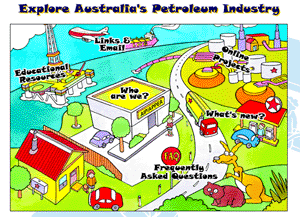 At the annual Independent Petroleum Association of America conference, Kathryn Ratte of the Political Economy Research Centre (PERC) recommended that this situation be addressed with specially designed school materials and teacher workshops “in resorts or campuses in pleasant surroundings”. She pointed out the advantages of teaming up with an organization such as her own.
At the annual Independent Petroleum Association of America conference, Kathryn Ratte of the Political Economy Research Centre (PERC) recommended that this situation be addressed with specially designed school materials and teacher workshops “in resorts or campuses in pleasant surroundings”. She pointed out the advantages of teaming up with an organization such as her own.
"If it has a corporate logo on it, it is propaganda… You need a foot in the door where somebody else is pushing the door open for you.. The people best able to push open the door are non-profit education organizations that teachers already think of as being credible."
The petroleum industry has been active in both Australia and NZ since the 1990s hoping to “provide a more balanced account” of their operations. BP Oil NZ provided various curriculum materials to NZ schools on issues ranging from dealing with oil spills to global warming and ozone depletion. The AIP and the Australian Petroleum Exploration Association provides project materials, classroom speakers, and site visits amongst other activities for Australian schools.
 The API subsequently teamed up with the American Association for the Advancement of Science to produce classroom materials on energy distributed by Project Learning Tree. They describe how students and society “depend on oil” and how miserable life would be without it:
The API subsequently teamed up with the American Association for the Advancement of Science to produce classroom materials on energy distributed by Project Learning Tree. They describe how students and society “depend on oil” and how miserable life would be without it:
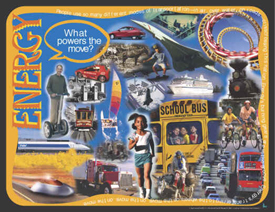
"What if it weren’t easy to fuel a car? Or what if it were more expensive?... If airplanes and trucks couldn’t be fuelled easily or it was more expensive to fuel them, how would that affect products you and your parents buy in stores?....Did you know that CD players, DVDs, ink, some clothing, computers, containers, telephones, and toothpaste are also petroleum products?... What would your life be like without these?”
Shell Oil’s materials talked about how you need petrol and cars to get to nature.
Similarly the classroom materials of the Australian Institute of Petroleum (AIP) emphasise “the importance of oil and gas in our lives".
"How would we manage without petroleum products? Our everyday lives would be affected if we
 |
|
Most of the items we use in our homes and our schools have parts which have been made from a petroleum product."
Class activities include collecting examples of plastics, detergents, antiseptics, cosmetics and nylon, setting up a display in the classroom, and explaining how each item is linked with petroleum.
The Minerals Council of Australia similarly emphasises the benefits of mining and the wide use of mining products: “Mining provides modern society with most of the objects we use in everyday life – from cars to computer chips to cutlery to electricity. In fact, it’s a challenge to think of something that is not made from minerals or made using metal machinery!”
Students are asked to label as many items in their classroom as they can with the minerals they are made from and “write a newspaper, radio or television advertisement that promotes the properties of one particular metal or non metal product.”
 The American Coal Foundation has a lesson plan for grades 3-8 which seeks to give students “an appreciation for their dependency on electricity” and associate coal with this. Students are asked to think about what they would miss out on if they went without electricity for two hours and then, for homework, to try it. They then discuss in class what they had to do without.
The American Coal Foundation has a lesson plan for grades 3-8 which seeks to give students “an appreciation for their dependency on electricity” and associate coal with this. Students are asked to think about what they would miss out on if they went without electricity for two hours and then, for homework, to try it. They then discuss in class what they had to do without.
Fossil fuel industry education materials generally say little about the contribution of the industry to global warming and until recently have emphasised the uncertainty surrounding the issue and not taken responsibility as an industry for their contributions.
For example the American Coal Foundation claimed in its “Power from Coal Activity Book” that some scientists believe that additional carbon dioxide from coal and fossil fuels will warm the climate but “other scientists do not believe this is likely… Still others’ research indicates the earth could benefit… More time is needed for researchers to gather information on these questions”.
The Foundation’s current materials, found on its teachcoal.org website, tend to omit the question of global warming altogether. For example its ‘educational’ article on “Coal and the Environment” says “coal has some environmental challenges to overcome” but that the “industry is working hard to ensure that the mining and use of coal does not permanently damage land or pollute air”. Not only does it claim to restore the land used for mining, but it cites the various technologies that are available to reduce emissions from coal burning such as sulphur, nitrogen and dust particles. There is no discussion about the extent that such technologies are actually used in practice. Nor are carbon dioxide emissions mentioned.
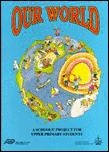 A student resource from the AIP puts global warming in an archaeological context: “Throughout geological time the Earth has experienced many different environments and survived… It is necessary for us to monitor our climate, our air and our water to ensure that nature can keep pace with the changes which are occurring.” What is more “All energy on Earth comes originally from the sun”.
A student resource from the AIP puts global warming in an archaeological context: “Throughout geological time the Earth has experienced many different environments and survived… It is necessary for us to monitor our climate, our air and our water to ensure that nature can keep pace with the changes which are occurring.” What is more “All energy on Earth comes originally from the sun”.
The Petroleum Club of Western Australia claimed on its website on The Petroleum Industry and the Environment: “One major contributor to the Greenhouse Effect is the de-forestation of significant areas of the planet…. Yet the destruction of the forests lies beyond the control of our industry”.
ExxonMobil’s Energy Chest website states “The earth is believed to be getting wrmer and sea levels appear to be rising More research is required to assess what is causing these apparent changes.”

British Gas's Generation Green lessons for primary students emphasise that coal powered contribute to global warming but say nothing about the contribution of gas (see for example In the Greenhouse).
Confidential documents reveal that the foundation/corporate-funded Heartland Institute plans to pay David Wojick, a the US Department of Energy consultant who has also worked for electricity and coal companies, to produce global warming classroom materials aimed at countering the tendency of teachers to be too alarmist about global warming: "His effort will focus on providing curriculum that shows that the topic of climate change is controversial and uncertain - two key points that are effective at dissuading teachers from teaching science. We tentatively plan to pay Dr. Wojick $100,000 for 20 modules in 2012".
The fossil fuel industry also downplays the environmental damage caused by oil spills and other pollution arising from its operations. The AIP claims in its education materials that “petroleum is a clean, affordable and plentiful source of energy”. Its classroom materials claim: “Oil spills from offshore production have been insignificant and, while there have been some spills arising from shipping accidents, none has had a lasting adverse impact on the marine environment.”
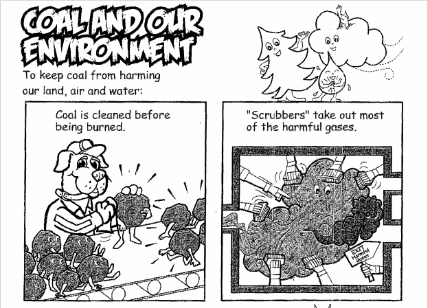
Source: Children's Colouring Book
from Friends of Coal and the West Virginia Coal Association
AIP materials also claim that people get most of their exposure to benzene from the food they eat and cigarettes: “There is no evidence that the very low levels of benzene exposure associated with motoring are a risk to the public.” In contrast the World Health Organisation (WHO) identified “emissions from motor vehicles as the largest source of this chemical detected in the general environment”.
 The Australian Gas Association claims natural gas is “environmentally clean, improving air quality and reducing the growth in Australia’s greenhouse gas emissions… In mainstream electricity generation, power stations fuelled by natural gas are far cleaner than those burning oil, black coal or brown coal”. Students might be forgiven for missing the fact that gas is also a fossil fuel and contributes to greenhouse gas emissions.
The Australian Gas Association claims natural gas is “environmentally clean, improving air quality and reducing the growth in Australia’s greenhouse gas emissions… In mainstream electricity generation, power stations fuelled by natural gas are far cleaner than those burning oil, black coal or brown coal”. Students might be forgiven for missing the fact that gas is also a fossil fuel and contributes to greenhouse gas emissions.
Industries that are criticised for their pollution, produce materials that stress the environmental measures their companies are taking to minimise that pollution. Often these are measures required by law but they are presented as an act of corporate responsibility.
 The AIP claims in its classroom materials that “The petroleum industry takes special care in all its activities to protect the environment".
The AIP claims in its classroom materials that “The petroleum industry takes special care in all its activities to protect the environment".
One of AIP's books for primary students, The Big Book of Oil and Gas, claims:
"The air we breath is healthier because scientists have developed petrol which makes less harmful gases when used to fuel engines. That’s why car engines are now designed to run on unleaded petrol… The oil and gas industries care about the environment and are always looking for new ways to protect the world we live in."
The book does not mention that the AIP, lobbied against the introduction of unleaded petrol and published a booklet “Why keep lead in petrol?” that argued against unleaded petrol.
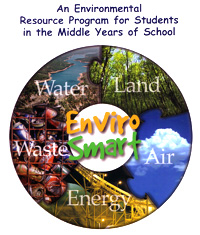 The American Petroleum Institute similarly boasts of improvements undertaken by the oil industry to protect the environment but most are required by laws that the industry fought against.
The American Petroleum Institute similarly boasts of improvements undertaken by the oil industry to protect the environment but most are required by laws that the industry fought against.
The Minerals Council of Australia has produced An Environmental Program for Students in the Middle Years of School entitled EnviroSmart that uses environmental management in the minerals industry as a template for “developing a school environmental management plan”. The Council points to all the environmental measures taken by the mining industry and that the industry “has developed a Code for Environmental Management to encourage all companies to manage their environmental impacts even better than they are required by law”.
The fossil fuel industry likes to emphasise individual responsibility for energy use. Electricity companies such as Commonwealth Edison produced materials stressing the role of the individual in using energy wisely rather than the role of corporations in deciding how the electricity will be produced.
ExxonMobil’s Energy Chest website states “We all need to live more sustainable lifestyles to slow down the rate of global warming and conserve our precious resources.” It also asks:
Project Learning Tree classroom materials on energy also stress the role of students in reducing their personal energy use rather than considering industrial energy use or who makes the decisions to choose fossil fuels as a source of energy. Its Energy and Society program “was made possible with a generous grant from the American Petroleum Institute (API)” and the advisory committee for this program includes representatives of the API, the Alliance of Automobile Manufacturers, the American Coal Foundation, and Pacific Gas and Electric Company (PG&E).
BP Educational Service provides a carbon footprint toolkit to enable children to work out their carbon footprint.
Industry materials suggest alternatives are a long way into the future: “New ways of storing energy mean that one day we will be able to have cheap, clean, renewable energy”.
If you have any examples or updates you would like to contribute please email them to me and I will add them here. Please give references for where you sourced the information.